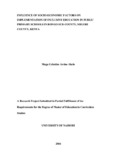| dc.description.abstract | Education is recognized as one of the basic human rights regardless of individual differences. In Migori County and particularly Rongo Sub-County, significant advances have been made towards promoting inclusive education in regular schools. The purpose of this study was to establish the influence of socio-economic factors on implementation of inclusive education in public primary schools in Rongo sub –county. The study sought to determine the extent to which family’s economic status influences the implementation of inclusive education in public primary schools, to establish the influence of family’s attitude towards children with special needs in the implementation of inclusive education in public primary schools, to assess the extent to which family’s religious beliefs influences the implementation of inclusive education in public primary schools and to determine the extent to which parental level of education influences the implementation of inclusive education in public primary schools. This study used descriptive survey design employing both qualitative and quantitative approach. The target population for this study was all 42 head teachers from the 42 public primary schools offering inclusive education, all 95 pupils with special needs in education, 336 class teachers and 336 parents from the 42 schools, that is 8 class teachers and 8 parents of learners with special needs in education per school. the researcher used 30% of the target population because this percentage was able to represent target population characteristic. Simple random sampling was used to sample the 42 public primary schools which offer inclusive education. 42 head teachers, 95 pupils with special needs in education, 100 class teachers and 100 parents of learners with special needs in education from the 42 schools were further be sampled purposively since they had relevant information. That is, 2-3 class teachers and parents of learners with special needs in education per school depending on the school size. To address research objectives and research questions, data was collected by the use of questionnaire for both the head teachers and teachers and interviews for the learners and parents. Quantitative data was analyzed by use of descriptive statistics such as frequencies, percentages since they could easily be interpreted by many people and inferential statistics such as correlation analysis. The study found that family’s economic status, family’s attitudes, family’s religious beliefs and parents education level of learners with special needs in education had an influence on the implementation of inclusive education. The family’s economic status of learners with special needs in education was low. There was very little interaction between learners with special needs in education and those without special needs in education in the schools and the early intervention of learners with special needs in education was also low. Educated parents of learners with special needs in education in the schools embrace the implementation of inclusive education to a large extent. Religion should continue to sensitize community on education of learners with special needs to minimize their stigmatization and discrimination. The teachers should as well sensitize the other pupils so as to prevent the stigmatization and discrimination of learners with special needs in the schools. The Ministry of Education needs to mobilize stakeholders of Special Needs Policy in providing direction on the objectives of inclusive education. The sensitization should be done to the learners, the teachers, parents and the community as well. | en_US |



